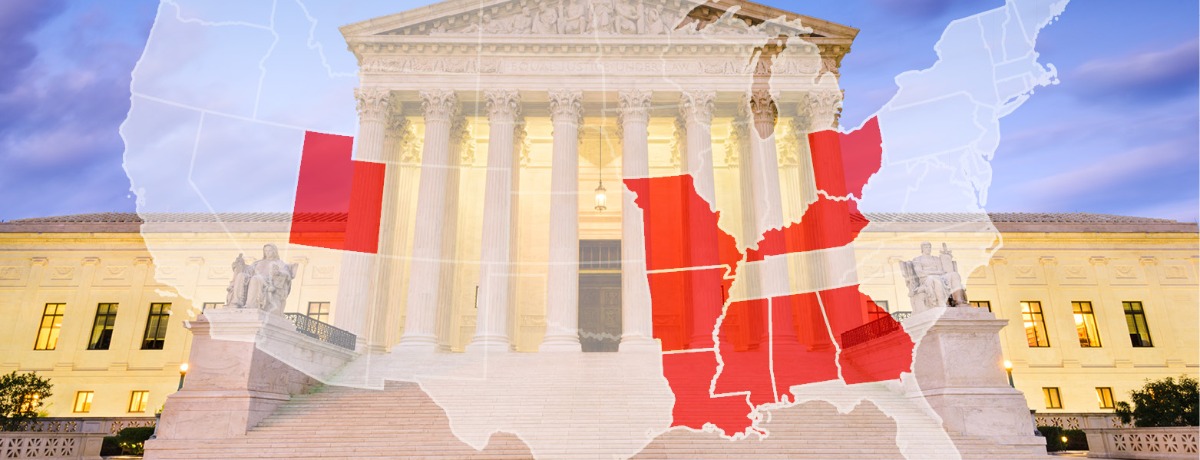In real estate, it is location, location, location. In appellate practice, it is forum, forum, forum.
The flurry of laws currently being enacted in states including Georgia, Alabama, Missouri, and Ohio are all driven by a seismic change in the ultimate forum—the U.S. Supreme Court. With the confirmation of Brett Kavanaugh to the Court late last year, right to life/anti‑abortion groups scrambled to enact state laws that severely restrict a woman’s right to choose—thus teeing up a complete reconsideration of Roe v. Wade.
For the first time since Roe was decided in 1973, those opposed to its holding feel confident that there are five votes on the Supreme Court willing to overturn its finding that:
“A state criminal abortion statute…that excepts from criminality only a life-saving procedure on behalf of the mother, without regard to pregnancy stage and without recognition of the other interests involved, is violative of the Due Process Clause of the Fourteenth Amendment.”
The holding of Roe determined that, in the first trimester, “the abortion decision and effectuation must be left to the medical judgment of the pregnant woman’s attending physician.” In the second trimester, “the State, in promoting its interest in the health of the mother, may, if it chooses, regulate the abortion procedure in ways that are reasonably related to maternal health.” In the third trimester, Roe weighed the state’s “interest in the potentiality of human life” more heavily, thus, permitting the state to “regulate and even proscribe, abortion except where it is necessary…for the preservation of the life or health of the mother.”
New state laws fly in the face of Roe’s trimester by trimester analysis. In Missouri, as of May 17, no woman may have an abortion after the first eight weeks of pregnancy. Nor does Missouri permit exceptions for rape or incest. Similarly, on May 7, Georgia joined three other states that in just the last year banned abortions after six weeks of pregnancy—considered a proxy for the time that a doctor can detect a fetal heartbeat. Alabama now essentially bans all abortions—once again without exception for pregnancy caused by rape or incest.
Even before these new laws, there were a number of cases percolating through the federal courts addressing state laws implicating the issues of:
- parental consent;
- requirements of hospital privileges for abortion providers;
- reporting requirements concerning abortion procedures;
- requirements that abortion providers have agreements with ambulance companies and hospitals;
- mandatory ultrasounds;
- fetal tissue disposal; and
- prohibition of dilation and evacuation abortions.
The first of these challenges to reach the newly composed Supreme Court was Box v. Planned Parenthood of Indiana and Kentucky. In a per curiam decision, the court reversed the Seventh Circuit’s determination that Indiana’s restrictions on the disposition of fetal remains was not rationally related to Indiana’s stated interest in “the ‘humane and dignified disposal of human remains.’” In the same per curiam ruling, the court declined to consider the question of whether “Indiana may prohibit the knowing provision of sex-, race- and disability-selective abortions by abortion providers.” Instead, pointing out that the Seventh Circuit has been the only circuit to address the issues thus far, the court denied certiorari consistent with its “ordinary practice of denying petitions insofar as they raise legal issues that have not been considered by additional Courts of Appeals.”
Court watchers are left reading the Indiana tea leaves. One thing seems fairly clear—there were not five votes on the Supreme Court interested in reviewing and overturning the Seventh Circuit’s rejection of Indiana’s statute prohibiting abortions based on sex-, race-, and/or disability-selectivity. For those behind the new state laws that unambiguously contravene the holding of Roe, the court’s lack of appetite to take up the first challenge before it may be a cause for caution.
It does, however, also seem pretty clear that with all of the challenges to different state laws restricting the rights established by Roe wending their way through multiple circuits, there is likely to be a point where there are conflicting decisions in two or more circuits. As stated in Box, that is a time where, characteristically, under Rule of the Supreme Court 10, certiorari is granted and an issue is joined. At that point, more conservative justices, including Gorsuch and Kavanaugh, will be tested. Overruling established Supreme Court precedent is relatively rare. However, a state law outright outlawing abortions in the first and second trimesters of pregnancy is undeniably in contravention of the protections provided by Roe.
What happens if Roe is overturned? If the Fourteenth Amendment does not protect a woman’s right to decide, it is no longer a federal issue. As before Roe, abortions will be regulated exclusively by state law, on a state-by-state basis.
































